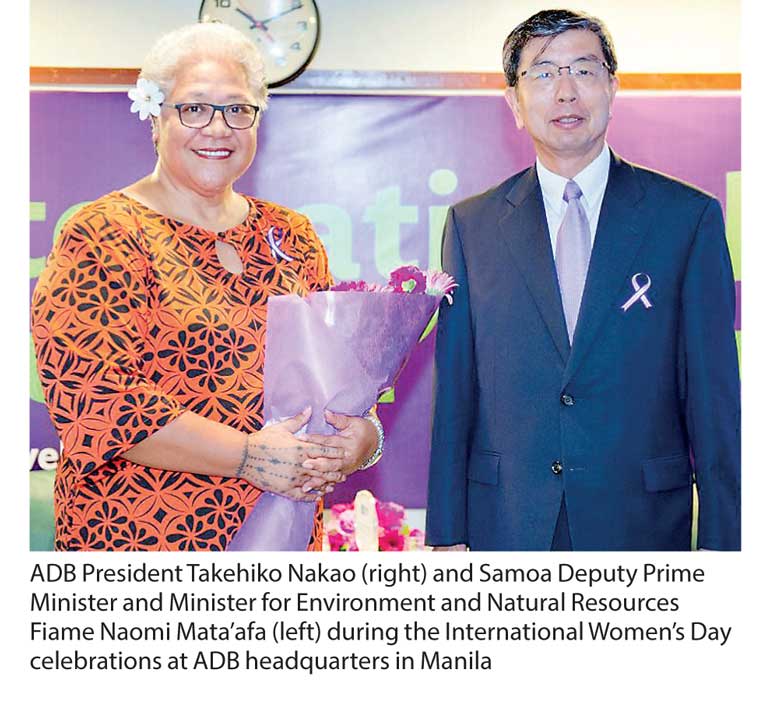Tuesday Feb 17, 2026
Tuesday Feb 17, 2026
Friday, 9 March 2018 00:00 - - {{hitsCtrl.values.hits}}
 Asian Development Bank (ADB) President Takehiko Nakao yesterday marked International Women’s Day by reaffirming his commitment to make ADB a champion of gender equality both in its operations and as an institution.
Asian Development Bank (ADB) President Takehiko Nakao yesterday marked International Women’s Day by reaffirming his commitment to make ADB a champion of gender equality both in its operations and as an institution.
“International Women’s Day is a chance to celebrate achievements in advancing women’s status and gender equality around the world,” said Nakao. “Much progress has been made to advance gender equality but there is still much to do. ADB is committed to playing its part and continuing to make advancing gender equality integral to ADB’s operations.”
During an event at ADB headquarters, Nakao hosted Samoa Deputy Prime Minister and Minister for Environment and Natural Resources Fiame Naomi Mata’afa, who shared the Pacific island country’s experience in advancing the role of women in decision making.
Mata’afa is the first woman Deputy Minister of Samoa and one of the longest standing members of parliament. She also served as Minister of Women and has held several other ministerial posts in Samoa.
“If women’s level of representation in politics is an indicator, then, at 7%, we would have to say that the level of development in the Pacific is low,” said Mata’afa. “Partnership with institutions like ADB is a long-term commitment, it requires patience. It’s important to work with traditional and customary authorities because they play a vital role in life in the Pacific, in creating opportunities for women, especially in education.”
Guided by its Gender Equality Operational Plan, ADB is moving steadily towards incorporating stronger gender design elements in its projects, having achieved this in 48% of its overall lending compared to 27% a decade ago. Over the last 5 years, ADB’s gender equality success rate for completed projects has also improved from less than 50% to over 70%.
Nakao highlighted several notable achievements by ADB in promoting gender equality in the region in the areas of higher education, technical and vocational education and training, access to finance, jobs and markets, and participation in decision making related to climate change mitigation and adaptation.
Turning to gender equality within the organisation, Nakao stressed that, while nearly 59% of all ADB staff were women, ADB needed to do more to improve representation of women in leadership roles. Some of ADB’s ongoing efforts to promote gender equality within the organisation include the goal of increasing women’s representation among international staff to 40% by the end of 2022, the updating of its guidelines in 2017 to support flexible work arrangements such as work from home, and the creation of a Respectful Workplace Unit, also in 2017, to provide a respectful work environment for all staff.
“Efforts for gender equality at ADB are a never-ending business, and a priority for me,” said Nakao. “I urge all staff, managers, and vice-presidents to make persistent and determined efforts to achieve gender equality.”
ADB, based in Manila, is dedicated to reducing poverty in Asia and the Pacific through inclusive economic growth, environmentally sustainable growth, and regional integration. Established in 1966, it is owned by 67 members—48 from the region.